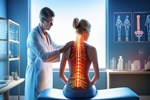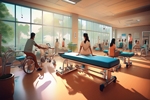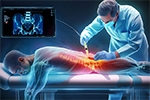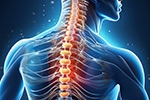Home »
Blog » Pain Management
| Stem Cell, PRP, Acupuncture in Queens & Long Island, New York
Pain Management | Stem Cell, PRP, Acupuncture in Queens & Long Island, New York
Spinal stenosis is a condition where the spinal canal narrows, putting pressure on nerves and causing pain, numbness, or weakness. Common in older adults, it often affects the lower back or neck. At Precision Pain Care and Rehabilitation, we use interventional pain management techniques like epidural steroid injections, radiofrequency ablation, and spinal cord stimulation to relieve symptoms. Our goal is to improve mobility and quality of life without surgery.
Read more
Struggling with persistent back pain? Physical therapy can help relieve pain, restore mobility, and prevent future discomfort. Through targeted treatments like core-strengthening exercises, manual therapy, and advanced modalities such as ultrasound and electrostimulation, you can regain strength and improve posture. With the right approach, long-term relief is possible—helping you stay active and pain-free in daily life.
Read more
For many individuals suffering from chronic back pain, surgery is often considered a last resort. Fortunately, epidural steroid injections (ESIs) offer a non-surgical approach to pain relief by reducing inflammation around the spinal cord and nerves. These injections provide temporary relief but, when combined with therapeutic exercises, may help delay or even eliminate the need for surgery.
Read more
Back pain is a leading cause of disability worldwide, affecting individuals of all ages and lifestyles. While often manageable, its impact on daily life underscores the importance of informed, evidence-based care. This guide outlines the causes, diagnostic approaches, and treatment strategies to help patients better understand their condition and collaborate effectively with healthcare providers.
Read more
Tendonitis is a common condition that can cause significant discomfort and disrupt daily activities. It occurs when a tendon—the thick, fibrous cord connecting muscle to bone—becomes inflamed due to overuse, injury, or age-related degeneration. At Precision Pain Care and Rehabilitation, our focus on interventional pain management provides advanced treatment options to help patients find relief and regain mobility. This blog explores tendonitis, its causes, symptoms, treatment options, and how interventional pain management can be an effective approach for long-term recovery.
Read more
Shoulder pain can significantly affect your daily life, limiting mobility and causing discomfort during routine activities. The shoulder is a complex joint composed of bones, tendons, ligaments, and cartilage. Its versatility makes it susceptible to various injuries and conditions. Interventional pain management techniques provide innovative solutions for diagnosing and treating shoulder pain, offering relief without invasive surgeries.
Read more
Shoulder impingement syndrome, also known as swimmer’s shoulder, occurs when the rotator cuff tendons become compressed between the shoulder bones, often due to repetitive overhead motions or aging-related wear and tear. This condition leads to pain, reduced mobility, and difficulty performing daily tasks. At Precision Pain Care and Rehabilitation, comprehensive care options, including interventional pain management, aim to relieve symptoms and restore function.
Read more
Low back pain is one of the most common conditions affecting adults worldwide, contributing to reduced mobility, decreased quality of life, and lost productivity. For many, persistent pain can make daily tasks feel insurmountable but effective treatment options are available. At Precision Pain Care and Rehabilitation, interventional pain management offers relief for those struggling with low back pain, allowing them to return to a more active and pain-free life.
Read more
Leg pain can range from a minor inconvenience to a life-limiting condition, affecting mobility and overall quality of life. Precision Pain Care and Rehabilitation specializes in providing solutions for leg pain through interventional pain management—a treatment approach focusing on pinpointed therapies to alleviate pain, often without the need for major surgery.
Read more
Neck pain is one of the most common and debilitating issues that affects people of all ages, often disrupting daily routines and reducing quality of life. Whether due to poor posture, injury, or degenerative changes in the spine, neck pain can be challenging to treat with traditional methods alone. Fortunately, interventional pain management offers an array of specialized treatments aimed at providing relief, minimizing discomfort, and enhancing mobility.
Read more
Love this Post? Spread the World
























